Scottish Independence: EIS launches manifesto


Teachers’ leaders in the Educational Institute of Scotland (EIS) union have today launched their own manifesto ahead of the crucial September 18 vote.
Whatever the outcome of that, the union vowed to “continue to challenge future Scottish governments to deliver for Scotland’s young people”.
Advertisement
Hide AdAdvertisement
Hide AdEIS general secretary Larry Flanagan said: “We are urging both sides of the referendum debate, and each of the parties involved, to make clear their commitments on how Scottish education will be supported in the future.”
The EIS is not affiliated to any political party, or either the Yes Scotland or the Better Together referendum campaign groups, with Mr Flanagan stressing the decision over the country’s future was a matter for voters.
But he said union leaders were “eager” to hear from politicians involved in the campaign about their plans for education after the referendum, regardless of the outcome of the ballot.
Mr Flanagan said: “The people of Scotland will have a momentous decision to make on September 18, choosing Scotland’s future.
“Deciding on how to cast their vote is a matter for each of our members and the EIS is promoting neither a yes nor a no position in the referendum.
“However, we are eager to hear from all parties to the debate about their plans for Scottish education post-referendum, no matter what the result proves to be.
“The questions we are raising in the EIS manifesto highlight the key issues facing our schools, colleges and universities, and ask how these will be addressed by each party following the referendum.”
In the manifesto the union argued class sizes in schools should be set at “an absolute maximum of 20 pupils” and stressed it would oppose any attempt to introduce fees for Scottish universities.
Advertisement
Hide AdAdvertisement
Hide Ad“Scotland is rightfully extremely proud of its education system, which continues to offer a high-quality comprehensive education to all pupils and free access to high-quality further and higher education opportunities for people throughout the country,” Mr Flanagan said.
“Education has faced many challenges in recent years, including the difficulties created by the financial crisis and the cost-cutting austerity agenda.
“Teachers and pupils have faced the challenges of a major programme of curricular change, which has placed additional workload and strain on everyone with the school community.”
Mr Flanagan also stressed education policy must continue to be decided north of the border, stating: “Thankfully, policy decisions on Scottish education have long been made in Scotland and this has been enhanced since the establishment of the Scottish Parliament in 1999.
“This has protected our education system from the damaging changes we see south of the border.
“It can be argued that this shows that devolution works or that it is a taste of what might be achieved with the greater powers that independence offers. That is the decision facing teachers.
“Irrespective of the result of the referendum, however, the policy decisions relating to Scottish education must continue to be made in Scotland.”